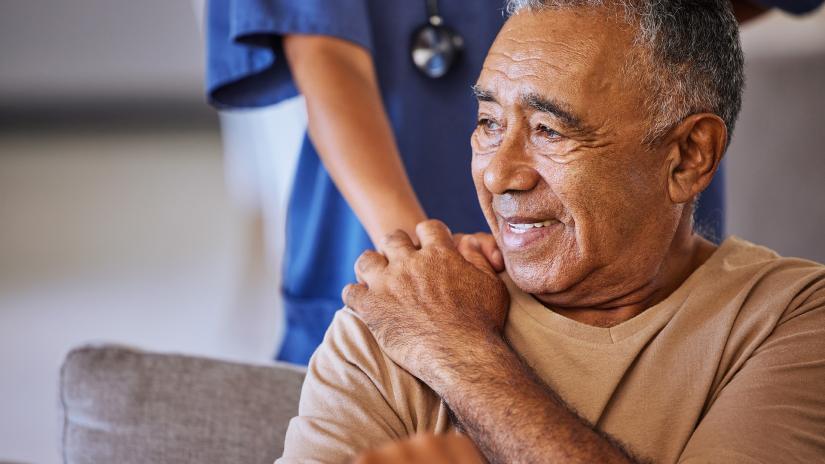This transdisciplinary project will deliver it.

Older Australians make up 6 in 10 people diagnosed with cancer, and those aged 60+ account for 80 per cent of cancer deaths — but despite these staggering figures, our national cancer care system often fails to meet their needs.
“We know that older people often don’t get offered evidence-based cancer treatments that are known to improve their cancer outcomes because of ageism,” says Professor Meera Agar, Director of the UTS Centre for Improving Palliative, Aged and Chronic Care through Clinical Research and Translation (IMPACCT).
“They also tend to have unmet physical, psychological and information needs and other medical problems other than their cancer that aren’t always taken into account through multidisciplinary care.
“We’ve managed to create a cancer system that can be completely oblivious to the fact that two out of three people walking in the door are older people. The question is, why is something so obvious, so invisible?”
A whole-person model of care
It’s a question that Professor Agar and her colleagues at IMPACCT and a team of researchers and clinicians nationally will address with a new project funded by the Medical Research Future Fund. IMPACCT is one of the foundational research centres within the Institute for Innovative Solutions for Wellbeing and Health (UTS INSIGHT), a cross-disciplinary research initiative within the UTS Faculty of Health.
Called Delivering Better Care for Older Australians with Cancer, the project will evaluate the impact of a whole-person geriatric model of care (GMOC) compared to a screening-only model. It will be rolled out at six public and private cancer centres in regional and metropolitan areas across Australia.
The GMOC will be comprised of four key elements — geriatric screening, comprehensive geriatric assessment for at-risk patients, shared decision-making between patients and their clinical team, and ongoing monitoring — that aim to address the variety and complexity of older people’s cancer care needs.
“We know that older people experience worse cancer outcomes than their younger counterparts,” Professor Agar says.
“If we can support cancer services to conduct proper comprehensive assessments using the principles of care for older people and integrate them into cancer care, it will lead to the right treatments and to all the other social supports that older people need.”
The researchers will measure how the GMOC impacts older people with cancer, with a particular emphasis on whether it leads to enhanced clinical outcomes and helps older people with cancer to achieve their health and treatment goals.
They’ll also investigate whether the GMOC helps clinicians make better assessment and clinical decisions; whether it reduces the use of acute and other health services; and how it shapes the individual, local and systemic factors impacting delivery of care.
With older people identified as a priority population within the Australian Cancer Plan, the project offers exciting potential to transform not only the patient experience of cancer care but the broader ecosystem in which that care is delivered.
“We want to understand the impacts of the model in terms of what people actually need and how we build that model within the cancer services themselves,” Professor Agar says.

Transdiscplinary research in action
Cancer might largely be a problem that needs to be tackled by health care systems, but re-imagining that system to better meet the needs of people with complex needs isn’t something that IMPACCT researchers nor health care professionals can do on their own.
“At IMPACCT, our research tackles real-world problems from a consumer-centred perspective — we try to step into the shoes of people living with chronic disease or palliative care conditions and say, what are the outcomes that matter to them?” says Professor Agar.
“How can we integrate the health care system with things like housing, banking, and community-based supports in a coordinated way to deliver the outcomes that people are looking for?
“The nature of these questions really requires a transdisciplinary answer.”
As such, the Delivering Better Care research team includes geriatricians, geriatric and regional oncology specialists, nurses, palliative care experts, biostatisticians and health economists, as well as consumers who have experienced cancer treatment themselves or have cared for a loved one with cancer.
The project is a snapshot of IMPACCT’s broader research approach: the Centre produces a vast range of palliative, aged and chronic care research projects, including independent or investigator-initiated clinical trials in palliative care and cancer symptoms, and quality improvement programs.
This work draws on vast academic expertise in health, science, law, economics, social sciences and more, and on critical insights from a vast range of clinician and industry partners. Input from consumers ensures that research reflects the priorities and real-world needs of people living with and recovering from cancer.
“We’re embedded in this transdisciplinary ecosystem in which we play a significant part in shaping these relationships, but it’s really a two-way street,” says Professor Agar.
“I think we’ve created a culture here where, because we were all trying to work towards a shared problem, then everyone has something to contribute. If we all put our minds together, then the chances are that we’ll be able to get some traction.”
Delivering Better Care for Older Australians with Cancer is supported by $1.48 million in funding from the Medical Research Future Fund.

